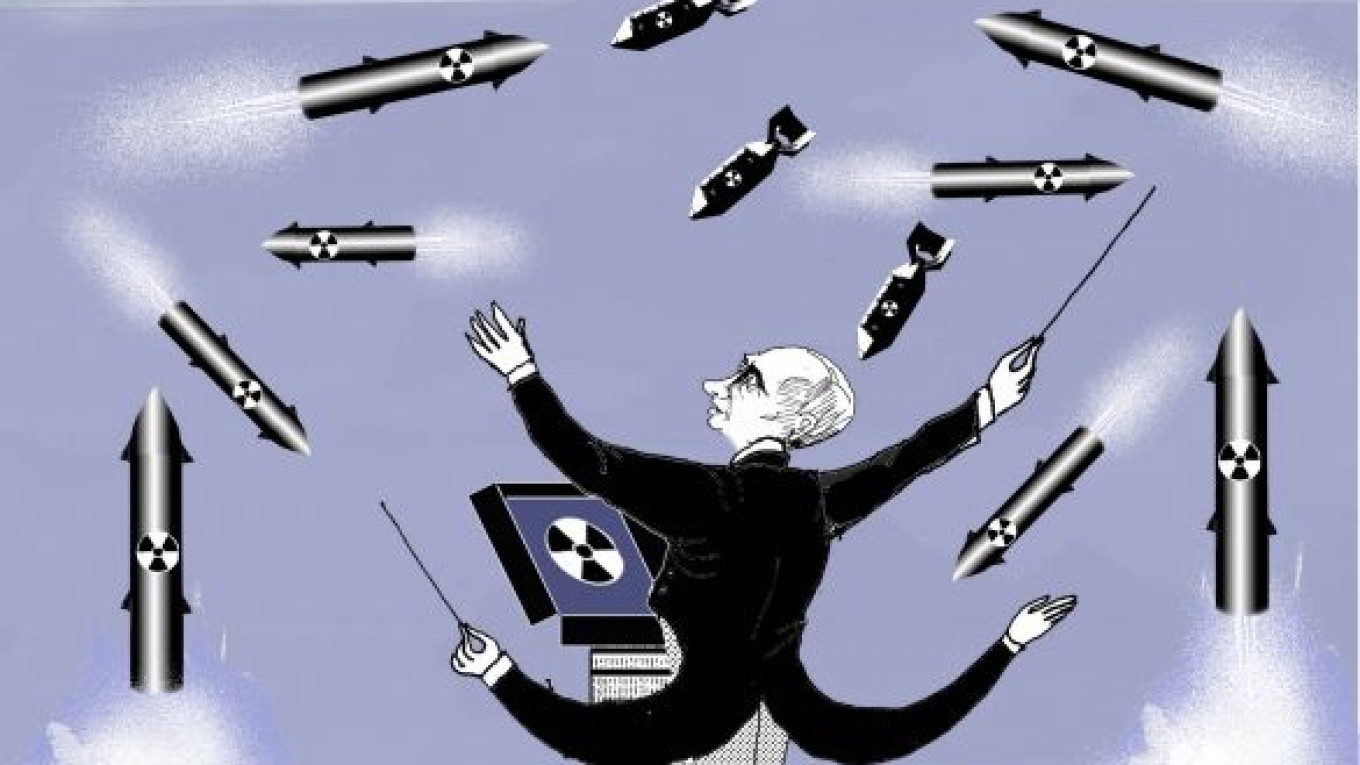Many people might not have noticed, but there was a nuclear war last week. Well, not really a war, but a simulation of one. On Friday, Tu-160 and Tu-95 strategic bombers launched four cruise missiles that successfully hit their targets on a range in the northwestern Komi republic. In addition, an RS-12M Topol ballistic missile was launched from the Plesetsk pad in northern Russia and hit its target in the Kamchatka region, and a submarine-launched intercontinental missile from the Sea of Okhotsk hit its target in the Arkhangelsk region.
The exercises, which the Kremlin spun as the largest nuclear command maneuvers in recent history, were a test run for a full-scale nuclear war, something Russia has been rehearsing regularly since NATO forces bombed Yugoslavia in 1999. The exercises indicate that the Kremlin still believes that a full-scale attack against this country, presumably from the United States, is possible and could be stopped only by a nuclear counterattack. This scenario calls for initial nuclear strikes against relatively unpopulated targets on enemy territory, to be followed by full-scale nuclear war, if necessary.
Notably, the tests, which involved all three components of the nuclear triad — land- and sea-launched long-range nuclear missiles and strategic bombers — were conducted "under the personal leadership of Vladimir Putin," as the Kremlin proudly said in a statement. It would seem that Putin used the occasion to test his "nuclear briefcase," the device that enables him to destroy the planet at a moment's notice. At a time when U.S.-Russian relations are strained, Putin decided to remind Washington that there is still one country in the world capable of destroying the U.S. This is especially important for Putin because he continues to believe that the United States is the root cause of all of his problems.
Yet the whole idea of Putin trying to intimidate the United States by flexing Russia's nuclear muscles has a serious flaw: Washington does not believe Putin is crazy enough to ever use his nuclear weapons against the U.S. Both sides understand perfectly well that such a move would be suicidal. By pressing the button in his nuclear briefcase, Putin would destroy much more than the U.S. He would also destroy his own privileged lifestyle, including his private swimming pool and mansions, not to mention his made-to-order tvorog sent to his residence daily by the patriarch.
At the same time, however, Putin would like to convince his overseas counterparts that he may be slightly off his rocker — or, at the very least, impulsive. And to his credit, Putin has done a good job fulfilling this task. The latest proof was Russia's demonstrative announcement that it would not continue its participation in the Nunn-Lugar program after it expires in May. That program funds safety enhancement efforts at nuclear weapons sites, the dismantling of nuclear submarines and the elimination of chemical weapons. For almost 20 years, U.S. taxpayers have spent on average $500 million yearly on a range of ways to help Russia protect its nuclear arsenal, from alarm systems and fire extinguishers to the transportation of dangerous munitions to plants where they could be dismantled.
Of course, Washington had its own strong incentive to fund the program. Nunn-Lugar began in 1992, when Russia lacked funds and expertise to ensure the security of its nuclear arsenal and the West feared nightmarish scenarios unfolding that would make the Chernobyl explosion look like child's play. By helping Russia destroy its extraneous and outdated weapons of mass destruction, the U.S. protected itself and the world from a global catastrophe.
Thus, the U.S. Congress would have no doubt continued to fund the program for another 20 or more years, but Russia is too proud to accept the aid. At the same, however, widespread fears that Russia will now largely ignore the problem of destroying old nuclear and chemical weapons are unfounded. So are concerns that the military brass will order inexperienced 18-year-old conscripts instead of highly qualified specialists to dismantle nuclear warheads. Critics like to cite this scenario, particularly given the widely publicized cases of negligence among officers and conscripts in dismantling conventional weapons. Indeed, there have been almost two dozen accidental explosions over the past 10 years. The most recent incident occurred earlier this month, when 4,000 tons of shells exploded in the Orenburg region. While it is true that basic security guidelines are often ignored with respect to conventional weapons, this cannot be said for nuclear and chemical weapons.
According to media reports, the Defense Ministry has asked the Finance Ministry to allocate hundreds of millions of dollars to enable it to maintain Russia's nuclear arsenal. Actually, this might be the real motive behind the Kremlin's nuclear strategy: to make the Americans sweat it out every day, worrying about the fate of Russia's nuclear warheads. In other words, nuclear deterrence, Russian-style.
Alexander Golts is deputy editor of the online newspaper Yezhednevny Zhurnal.
Related articles:
A Message from The Moscow Times:
Dear readers,
We are facing unprecedented challenges. Russia's Prosecutor General's Office has designated The Moscow Times as an "undesirable" organization, criminalizing our work and putting our staff at risk of prosecution. This follows our earlier unjust labeling as a "foreign agent."
These actions are direct attempts to silence independent journalism in Russia. The authorities claim our work "discredits the decisions of the Russian leadership." We see things differently: we strive to provide accurate, unbiased reporting on Russia.
We, the journalists of The Moscow Times, refuse to be silenced. But to continue our work, we need your help.
Your support, no matter how small, makes a world of difference. If you can, please support us monthly starting from just $2. It's quick to set up, and every contribution makes a significant impact.
By supporting The Moscow Times, you're defending open, independent journalism in the face of repression. Thank you for standing with us.
Remind me later.


